- Home
- James Rollins
Altar of Eden Page 2
Altar of Eden Read online
Page 2
If she looked the part, she might as well go all the way. She pulled out the pin holding her hair and let it fall around her shoulders, then climbed out of the truck and crossed toward the main entrance.
Before she could reach the facility’s front doors, a new noise drew her attention: a heavy wump-wumping. She turned toward the Mississipi. A white helicopter skimmed over the tree line and headed in her direction. It was coming in fast.
As she frowned, a hand settled on her shoulder from behind. She jumped slightly, but fingers squeezed in reassurance. A glance back revealed her boss and mentor, Dr. Carlton Metoyer, the head of ACRES. Covered by the noise of the helicopter, she had not heard his approach.
Thirty years her senior, he was a tall, wiry black man with bushy white hair and a trimmed gray beard. His family had been here in the region for as long as Lorna’s, tracing their roots back to the Cane River Creole colony, a blend of French and African heritage.
Dr. Metoyer shielded his eyes as he stared at the sky.
“We got company,” he said.
The helicopter was definitely headed toward ACRES. It swept toward an adjacent field and began to descend. She noted it was a small A-Star helicopter equipped with floats instead of the usual landing skids. She also recognized the slash of green across the white shell of the aircraft. After Katrina, most people in New Orleans knew that insignia. It was one of the Border Patrol helicopters; fleets of such choppers had been vital to the rescue operations and security following the disaster.
“What are they doing here?” she asked.
“They’ve come for you, my dear. They’re your ride.”
Chapter 2
Lorna’s stomach sank as the helicopter lifted off—not so much from the motion as from sheer panic. She clutched the armrests as she sat next to the pilot. The growing roar of the rotors penetrated her bulky headphones. It felt like rising in an elevator. An elevator strapped to a rocket.
She had never been a fan of heights, hated air travel in general, and considered riding an airborne lawn mower the height of madness. She had only flown once in a helicopter, during an externship in South Africa conducting a census of African elephants in the lands bordering a preserve. Back then, she had prepared for that flight by downing a pair of Xanax tablets before the trip. Still, her legs had felt like warm pudding for hours afterward.
And today she’d had no warning.
Dr. Metoyer had only filled her in on the sketchiest of details as the helicopter landed. He had not even given her time to go inside and inspect her project’s liquid nitrogen tanks. Staff is already on it, he had promised, adding that he’d check them himself and radio the details later.
Radio . . .
They were flying beyond any cell signal.
She risked a glance through the side window. The helicopter banked, giving her a bird’s-eye view of the Mississippi. They were traveling downriver, roughly following the Big Muddy’s course. The name was particularly apt following the storm. The river was a chocolate brown, rich with silt, eddying and churning as it flowed toward the Gulf of Mexico.
They were headed out over the river’s delta, where all that alluvium—silt, clay, sand, and soil—deposited and pushed out into the Gulf, forming over three million acres of coastal wetlands and salt marshes. Not only was the region environmentally significant, home to a vast and complicated ecosystem that traced its roots back to the Jurassic period, it was also commercially significant. The area supplied the United States with a large percentage of its seafood, and almost 20 percent of its oil.
It was also a weak link in the nation’s border. The maze of islands, twisting waterways, and isolated fishing docks made the delta a sieve for smugglers and traffickers of all sorts. The Department of Homeland Security had designated the region a high-level threat and reinforced the New Orleans station of the Border Patrol.
According to her boss, the Border Patrol had been searching the area following last night’s storm surge. It was common for smugglers to work under the cover of storms to bring in drugs, guns, even human cargo. Early this morning, a team had discovered a trawler beached on one of the outlying islands. After investigating the ship, they’d made a call to ACRES.
Much of that call remained a mystery, even to Dr. Metoyer. He had not been informed about the nature of the request, or why Lorna in particular had been asked to make this trip.
Despite her trepidation about air flight, a smoldering anger was building. She had projects in jeopardy over at ACRES. What was she doing flying out into the middle of nowhere? Her anger grew, stoked by her anxiety. What was going on? Why ask for her in particular? She knew no one in the Customs and Border Protection service.
The only answers lay at the end of this flight.
The radio built into her earphones crackled. The pilot pointed toward the horizon. He wore a green uniform with shoulder patches marking him as part of the Border Patrol’s Air and Marine unit. He had introduced himself, but she hadn’t caught his name.
“Dr. Polk, we’ll be landing in a few moments.”
She nodded and stared forward. The dense emerald of the swampy marshes broke apart below into a tangle of islands and peninsulas ahead. Farther out into the Gulf, a dark line near the horizon marked a row of larger barrier islands that helped protect the fragile marshes and coastal swamps.
But they weren’t going that far.
She spotted a shiny white boat moored by one of the small islands. Finally. As they descended toward it she also noted an old fishing trawler rammed into the beach. It had struck hard enough to topple a few trees and ride halfway up onto the island. It plainly had been shoved there by the storm surge.
The helicopter dropped fast. Her grip tightened on the armrests. She had read that a majority of air crashes occurred during takeoffs and landings. Not a statistic she wanted to bear in mind at the moment.
Within a few yards of the water, their descent slowed. The rotor-wash beat the waves flat. Then, as gently as a goose landing on a still pond, the chopper’s floats settled to the water. A few flicks of some switches and the whine of the rotors began to slow.
“Please stay seated,” the pilot said. “They’re sending a Zodiac out for you.”
His nod out the window drew her attention to a small rubber pontoon boat that pushed off from the island and shot toward them. Moments later, a crewman dressed in the same Border Patrol green helped her out of the helicopter and into the Zodiac.
She dropped onto a bench of the pontoon boat, both relieved yet still carrying a hot coal in her belly. She shaded her eyes as they headed toward shore, searching for some answer for the mysterious and sudden summons.
The morning was already growing warm as the sun broke apart the clouds and opened blue skies. The day promised to grow into one of Louisiana’s steam baths. And she was okay with that. She took deep breaths to steady herself, taking in the brackish odor of leafy decay, wet moss, and muddy salt water.
To her, it was the smell of home.
Her family had lived in Louisiana going back to the nineteenth century. Like all the old families of New Orleans, her history was as deeply ingrained as the lines on her palms. Ancestors’ names and stories were as familiar as if they’d died only yesterday.
During the War of 1812, her great-great-grandfather, only seventeen at the time, had abandoned the British army during the Battle of New Orleans and made his home in the new burgeoning frontier city. He met and married the daughter of the de Trepagnier family and quickly made a small fortune by growing sugarcane and indigo on a hundred-acre plantation given as a dowry. Over the years, that fortune continued to grow, and the Polk family was one of the first to build in the oak-shadowed glen of New Orleans’s Garden District. After selling the plantation, the family settled permanently in the district. Over the generations, the Polk mansion became respected as a gathering place for military generals, legal scholars, and countless men of science and letters.
The Italianate mansion still stood, but like the c
ity, the Polk family had begun a slow decline during the twentieth century. Only Lorna and her brother still bore the family name. Her father had died of lung cancer when Lorna was a child; her mother passed away a year ago, leaving the siblings a mansion in ill repair and a pile of debt.
But the tradition of valuing education continued. She had gone into medicine and science. Her brother, younger by a year, was an oil engineer working for the state. For the moment brother and sister, both single, shared the family estate.
A grind of wet sand on rubber pulled her back to the present.
The small island, one of a series forming a chain back to the dense coastal marshes, was covered in cypress trees matted together by Spanish moss. It looked impenetrable beyond the edge of the beach.
But that’s not where she was going.
“This way,” the Zodiac pilot said. He offered a hand to help her out of the boat, but she ignored him and climbed out herself. “The FOS is waiting to speak to you.”
“FOS?”
“Field operations supervisor.”
She didn’t understand the command structure of the Border Patrol, but it sounded like this was the guy in charge of the investigation. Maybe the one who had summoned her away from ACRES. Wanting answers, she followed the pilot toward the beached trawler. Having grown up along the river, she knew boats. The trawler was a small one, a forty-footer. Its starboard booms had been shattered by the collision, but on the port side, the long poles still pointed crookedly toward the sky. The shrimp nets were still tied down to the booms.
A handful of men, all in rough duty uniforms of the Border Patrol, gathered on the beach alongside the trawler. Some wore tan Stetsons, others green baseball caps. She also noted the holstered sidearms. One man had a Remington shotgun resting on a shoulder.
What was going on?
The men fell silent as she approached. A few pairs of eyes traveled up and down her form, looking little impressed. She kept her face fixed into something resembling a stern expression, but she felt her cheeks heat up in irritation. She resisted the urge to flip them all off.
Definitely a boys’ club here.
The agents parted to reveal a tall man similarly attired in dark green trousers and a matching long-sleeved work shirt, casually rolled to the elbows. He finger-combed his black hair, damp with sweat, and secured a black baseball cap in place. But not before his blue-gray eyes also examined her from head to foot. Unlike the others, she sensed nothing lascivious in his attention, only sizing her up.
Still, she was glad when the bill of his cap shadowed those eyes.
He crossed to close the distance between them. He stood well over six feet tall, broad-shouldered and muscular without looking bulky. His carriage was of someone who knew how to lead with no need to dominate. Confidence, along with a feral edge, flowed from him.
He held out a large hand as he reached her.
“Dr. Polk, thank you for coming.”
She shook his hand and noted a long scar down his forearm, from elbow to wrist. Glancing up, she met his gaze. His complexion was a tanned olive, further darkened by black stubble over his chin and jaw. Her ear picked up his slight French Cajun accent.
So he was local to the area. In fact, there was something naggingly familiar about him—and then it struck her. She was about to demand an answer as to why she was brought here.
Instead, a different question stumbled out.
“Jack?”
His lips, full but definitely masculine, shifted to a harder line as he gave the barest nod. Her image of him similarly transformed in a sudden shift of perspective. The anger drained out of her, replaced with something colder and more uncomfortable. It had been over ten years since she’d last seen him. She had only been a sophomore in high school; he had been a senior.
Though she hadn’t really known him well back then—in high school, two years was an insurmountable social gulf—they had darker ties that bound them together. A connection she had wanted forever left in her past.
From the expression passing like a cloud over his face, he possibly wished the same. Either way, now was not the time to reopen those old wounds.
“Dr. Polk,” he said stiffly. His accent grew thicker, more husky. “I called you here because . . . because I didn’t know who else had the expertise to offer guidance about what we found.”
She straightened her back, going equally professional. Maybe that was best. She swallowed and stared toward the trawler, glad for an excuse to look away. “What did you find?”
“You’d best see for yourself.”
He turned and led the way to the trawler. A rope ladder led up to the deck. He climbed first, clambering easily up. She was all too conscious of the hard strength in his legs and back. Once he vanished over the gunwale, one of his men secured the ladder’s lower end, making it easier for her to climb.
At the top, Jack helped pull her to the deck. Two other men stood guard by a door that led to the lower holds. One of them passed Jack a flashlight.
“Sir, we’ve run a portable lamp down into the hold, but it’s still damn dark down there.”
Jack thumbed on his flashlight and waved for her to follow. “Careful of the blood on the stairs.”
His light revealed a dark stain along one side of the steps. Like something had been dragged down into the hold.
She suddenly did not want to go down there.
“We found no bodies,” Jack said, as if sensing her discomfort. Or maybe he was merely filling her in on the details of the case.
She followed him down the steps and along a narrow passageway.
“They kept them caged in the main hold.”
She didn’t bother to ask what was caged. She already smelled the familiar musk of a rank kennel. She heard the shuffle of bodies, a rustling, a mewling cry, a sharp screech of a bird.
She began to understand why she had been summoned. Exotic animal smuggling was a billion-dollar-a-year industry, ranking just behind drug and gun trafficking. And unfortunately the United States was one of the leading consumers of such smuggled cargo, accounting for 30 percent of such sales.
She had read just last week about the bust of a major trafficking ring dealing in rare tigers. In that case, the Missouri couple wasn’t bringing in the big cats for pets, but for parts. They were smuggling in tigers, then butchering them. Hides of leopards, tigers, and lions could fetch upward of twenty thousand dollars. But that wasn’t all. Like some bloody chop shop, they were selling off all parts: tiger penises to be ground into aphrodisiacs, bones for arthritis cures. No part went to waste. Gallbladder, liver, kidneys, even teeth. In the end, such large cats were worth far more dead than alive.
She felt anger building as she followed Jack into the main hold.
A tall pole lamp lit the low-roofed space. Stainless-steel cages lined both sides of the long hold; larger pens in the back were still in shadows. She gaped at the size of the smuggling operation, certain now why she was needed here, a veterinarian specializing in exotic animals.
Jack turned and shone his flashlight into the nearest cage.
She stared inside—and knew she was wrong about everything.
Chapter 3
Jack Menard studied the woman’s reaction.
Shock and horror widened Lorna’s eyes. She covered her mouth with a hand. But only for a moment. After the initial surprise, he also recognized a glint of concern. Her eyes narrowed again, her lips drawn tight in thought. She moved closer to the cage.
He joined her and cleared his throat. “What type of monkeys are they?”
“Cebus apella,” she answered. “Brown capuchin monkeys, native to South America.”
Jack stared at the two who shared the small cage, squatting in their own filth, huddled and scared at the back of the cage. Their limbs and backsides were a deep chocolate brown, their faces and chests a softer tan, their heads capped in black. They were so small he could have cupped one in the palm of his hand.
“Are they babies?” he asked.<
br />
She shook her head. “I don’t think so. The fur coloring suggests they’re adults. But you’re right. They’re way too small. Pygmy versions of the breed.”
But Jack knew that wasn’t the most shocking aberration. With a quiet cooing noise, Lorna coaxed the pair to move toward the bars. Her coldly professional manner seemed to melt away, her face softening, relaxing. The pair of monkeys responded to her. Still hugging each other, they crept forward, clinging tightly. Not that they could ever truly be apart.
“Siamese twins,” Lorna said.
The two were joined at the hip—literally—fused together, sharing three legs but bearing four arms.
“Poor things,” she whispered. “They look half starved.”
They came to the bars, plainly needing reassurance as much as sustenance. Their eyes were huge, especially in such small faces. Jack sensed their hunger and fear and also a trace of hope. He reached into a pocket and removed a granola bar. He ripped it open with his teeth, broke off a piece, and handed it to Lorna.
She gently passed it through the bars. One of them took it with its tiny fingers—then the pair retreated to share the prize, huddled around it, nibbling from both sides. But their eyes never left Lorna.
She glanced to Jack. For a moment he saw the girl he remembered from his school days, before he left for the Marines. She had dated his younger brother, Tom, during their sophomore year—and the summer thereafter. He shied away from that memory.
Lorna must have sensed this well of pain. Her face hardened, going professional again. She nodded to the other cages. “Show me.”
He led her along the rows of cages, shining his flashlight into the shadowy recesses. Each enclosure held a different animal, some familiar, some exotic. But like the monkeys, they all bore some twisted abnormality. They stopped next at a large glass-walled terrarium that held a fifteen-foot Burmese python curled around a clutch of eggs. The snake looked ordinary enough until its coils slid more tightly around the eggs and revealed two pairs of folded vestigial legs, scaled and clawed, remnants of its lizardlike evolutionary origin.

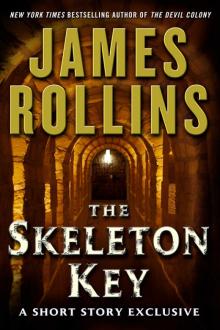 The Skeleton Key
The Skeleton Key The Last Oracle
The Last Oracle The Judas Strain
The Judas Strain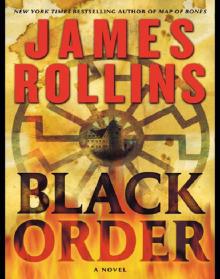 Black Order
Black Order Sandstorm
Sandstorm Ghost Ship
Ghost Ship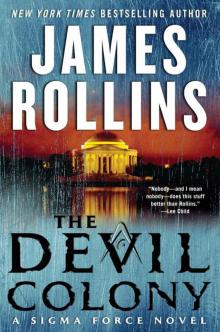 The Devil Colony
The Devil Colony Subterranean
Subterranean The Doomsday Key
The Doomsday Key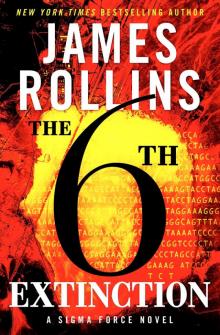 The 6th Extinction
The 6th Extinction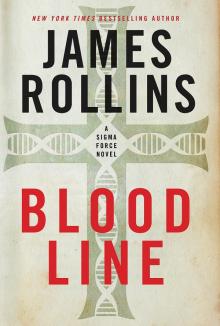 Bloodline
Bloodline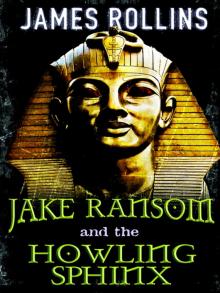 Jake Ransom and the Howling Sphinx
Jake Ransom and the Howling Sphinx The Midnight Watch
The Midnight Watch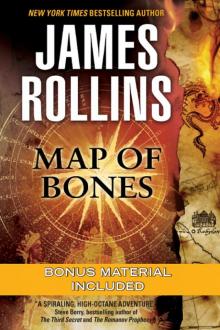 Map of Bones
Map of Bones The Demon Crown
The Demon Crown Deep Fathom
Deep Fathom Sigma Guide
Sigma Guide Kowalski's in Love
Kowalski's in Love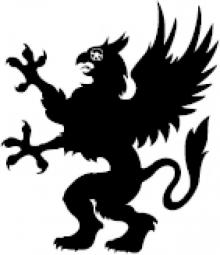 Jake Ransom and the Skull King's Shadow
Jake Ransom and the Skull King's Shadow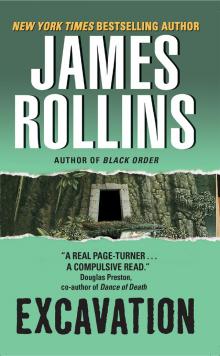 Excavation
Excavation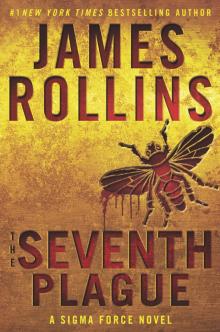 The Seventh Plague
The Seventh Plague Altar of Eden
Altar of Eden Unrestricted Access: New and Classic Short Fiction
Unrestricted Access: New and Classic Short Fiction Indiana Jones and the Kingdom of the Crystal Skull
Indiana Jones and the Kingdom of the Crystal Skull Crucible
Crucible The Eye of God
The Eye of God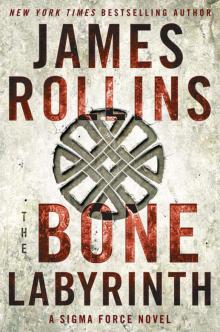 The Bone Labyrinth
The Bone Labyrinth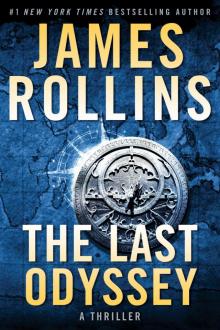 The Last Odyssey: A Thriller
The Last Odyssey: A Thriller Unrestricted Access
Unrestricted Access Amazonia
Amazonia Blood Brothers: A Short Story Exclusive
Blood Brothers: A Short Story Exclusive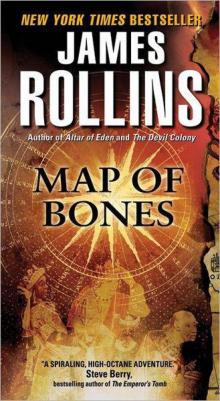 Map of Bones: A Sigma Force Novel
Map of Bones: A Sigma Force Novel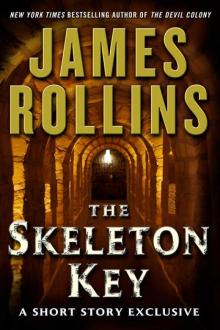 The Skeleton Key (sigma force)
The Skeleton Key (sigma force)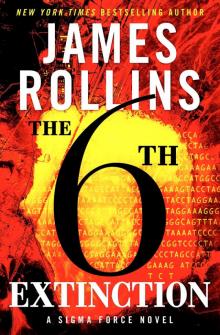 Sigma Force 10 - The Sixth Extinction
Sigma Force 10 - The Sixth Extinction Innocent Blood
Innocent Blood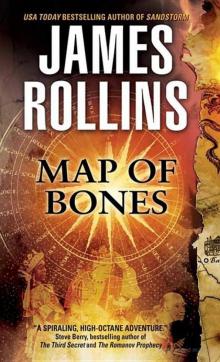 Map of Bones sf-2
Map of Bones sf-2 The Eye of God: A Sigma Force Novel
The Eye of God: A Sigma Force Novel The Eye of God: A Sigma Force Novel sf-9
The Eye of God: A Sigma Force Novel sf-9 The Pit
The Pit Indiana Jones and the The Kingdom Of The Crystal Skull
Indiana Jones and the The Kingdom Of The Crystal Skull The Last Oracle (2008) sf-5
The Last Oracle (2008) sf-5 City of Screams
City of Screams The Doomsday Key and The Last Oracle with Bonus Excerpts
The Doomsday Key and The Last Oracle with Bonus Excerpts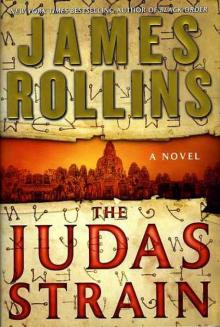 The Judas Strain sf-4
The Judas Strain sf-4 Blood Infernal
Blood Infernal The Demon Crown: A Sigma Force Novel
The Demon Crown: A Sigma Force Novel War Hawk: A Tucker Wayne Novel
War Hawk: A Tucker Wayne Novel SANDSTORM sf-1
SANDSTORM sf-1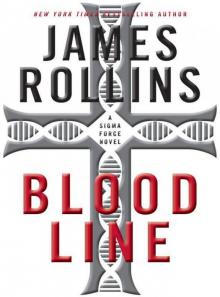 Bloodline: A Sigma Force Novel
Bloodline: A Sigma Force Novel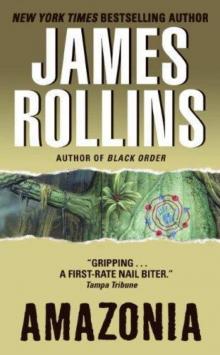 Amazonia: a novel
Amazonia: a novel The Last Oracle: A Sigma Force Novel
The Last Oracle: A Sigma Force Novel City of Screams (the order of the sanguines)
City of Screams (the order of the sanguines) Ghost Ship: A Sigma Force Short Story
Ghost Ship: A Sigma Force Short Story The Doomsday Key: A Sigma Force Novel
The Doomsday Key: A Sigma Force Novel